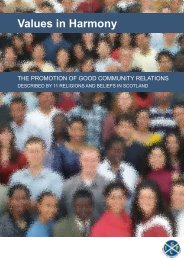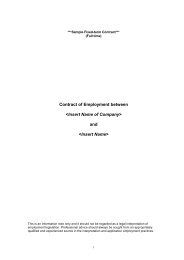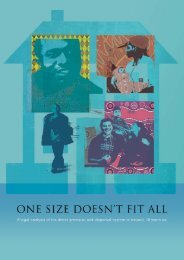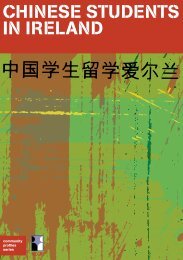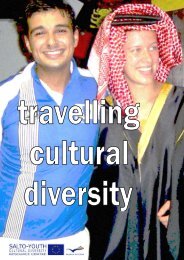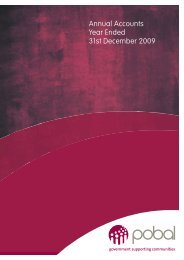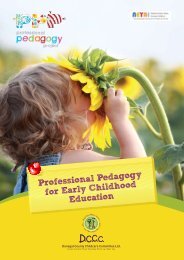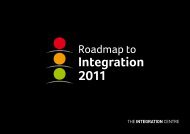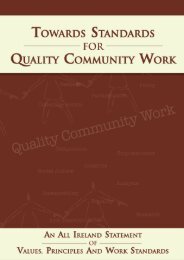Intercultural Education in the Post-Primary School - National Council ...
Intercultural Education in the Post-Primary School - National Council ...
Intercultural Education in the Post-Primary School - National Council ...
You also want an ePaper? Increase the reach of your titles
YUMPU automatically turns print PDFs into web optimized ePapers that Google loves.
• visual arts are used as a stimulus forexplor<strong>in</strong>g stereotyp<strong>in</strong>g and ‘firstimpressions’• arts are used as a basis for explor<strong>in</strong>grepresentations of conflict and peace,human rights and discrim<strong>in</strong>ation• a wide variety of students’ own work isdisplayed around <strong>the</strong> school.Sample lessons for Art can be found on <strong>the</strong>CD-ROM and at www.ncca.ie.Civic Social and Political <strong>Education</strong>Amongst <strong>the</strong> aims of CSPE is ‘to encouragepupils to apply positive attitudes,imag<strong>in</strong>ation and empathy <strong>in</strong> learn<strong>in</strong>gabout, and encounter<strong>in</strong>g, o<strong>the</strong>r people andcultures.’ Young people’s understand<strong>in</strong>gand appreciation of <strong>the</strong>ir identity as local,national and global citizens is at <strong>the</strong> heartof CSPE. All <strong>the</strong> core concepts whichunderp<strong>in</strong> CSPE are compatible with andsupportive of <strong>in</strong>tercultural education:stewardship, democracy, <strong>the</strong> law, humanrights, human dignity, development and<strong>in</strong>terdependence. Similarly, <strong>the</strong> four unitswhich constitute <strong>the</strong> content of <strong>the</strong> courseare hugely relevant to <strong>in</strong>terculturaleducation: The Individual and Citizenship,<strong>the</strong> Community, The State-Ireland, and <strong>the</strong>Wider World. Action Projects (whichrepresents 60 per cent of <strong>the</strong> totalexam<strong>in</strong>ation mark) provide students withan opportunity to take action on an issueof personal <strong>in</strong>terest or concern. This might<strong>in</strong>volve explor<strong>in</strong>g an issue ofdiscrim<strong>in</strong>ation and <strong>the</strong>n tak<strong>in</strong>g actionlocally or globally to address <strong>the</strong> problemor it could <strong>in</strong>volve organis<strong>in</strong>g a specialevent or awareness day to celebratediversity <strong>in</strong> <strong>the</strong> school. The Action Projectsalso offer great opportunities for <strong>the</strong>development of skills such as teamwork,critical th<strong>in</strong>k<strong>in</strong>g, analysis of differentop<strong>in</strong>ions and perspectives and participation<strong>in</strong> active citizenship.A detailed audit of <strong>the</strong> opportunities for<strong>in</strong>clud<strong>in</strong>g <strong>in</strong>tercultural <strong>the</strong>mes <strong>in</strong> CSPE aswell as sample lessons can be found on <strong>the</strong>CD-ROM and at www.ncca.ie.EnglishThe essential aim of teach<strong>in</strong>g English <strong>in</strong>post-primary junior cycle is to re<strong>in</strong>forceand cont<strong>in</strong>ue <strong>the</strong> work of <strong>the</strong> primaryschool <strong>in</strong> nurtur<strong>in</strong>g <strong>the</strong> <strong>in</strong>tellectual,imag<strong>in</strong>ative and emotional growth of eachstudent by develop<strong>in</strong>g his or her personalproficiency <strong>in</strong> <strong>the</strong> arts and skills oflanguage. This <strong>in</strong>volves <strong>the</strong> enhancement ofskills <strong>in</strong> three dynamically <strong>in</strong>terrelatedelements: personal literacy, social literacyand cultural literacy. In <strong>the</strong> liv<strong>in</strong>g contextof English teach<strong>in</strong>g <strong>the</strong>se three elementsform an organic wholeness of experience.The Junior Certificate English syllabus seeslanguage development as an <strong>in</strong>tegralelement of personal growth thoughEnglish, <strong>the</strong>reby recognis<strong>in</strong>g <strong>the</strong> centralityof language development <strong>in</strong> <strong>the</strong> learn<strong>in</strong>gand th<strong>in</strong>k<strong>in</strong>g processes. Growth <strong>in</strong>language proficiency does not occur <strong>in</strong> aneutral or value-free context, so <strong>the</strong>follow<strong>in</strong>g aims are <strong>in</strong>cluded <strong>in</strong> <strong>the</strong> syllabus:• to achieve diversification and enrichmentof each student’s personal, social andcultural l<strong>in</strong>guistic base• to enable, through language development,full and effective participation <strong>in</strong> society<strong>in</strong> a variety of roles• to develop students’ critical consciousness<strong>in</strong> respect of all language use.Diversity of language experience is crucialto <strong>the</strong> realisation of <strong>the</strong>se aims and, as <strong>the</strong>syllabus promotes a holistic approach tocourse design and classroom methodology,students should engage with texts <strong>in</strong> avariety of ways and from a variety ofperspectives. Teachers are free to choose<strong>the</strong> material <strong>the</strong>y consider most suitable for64<strong>Intercultural</strong> <strong>Education</strong> <strong>in</strong> <strong>the</strong> <strong>Post</strong>-<strong>Primary</strong> <strong>School</strong>




